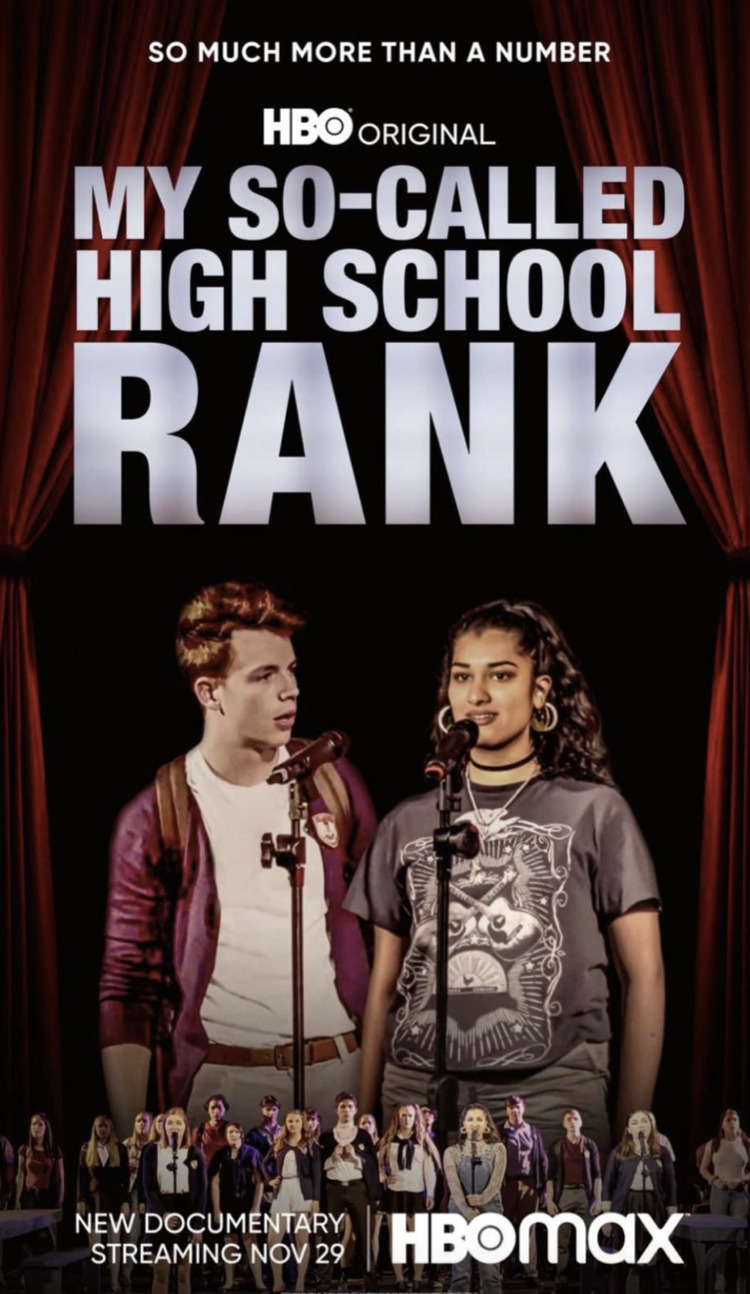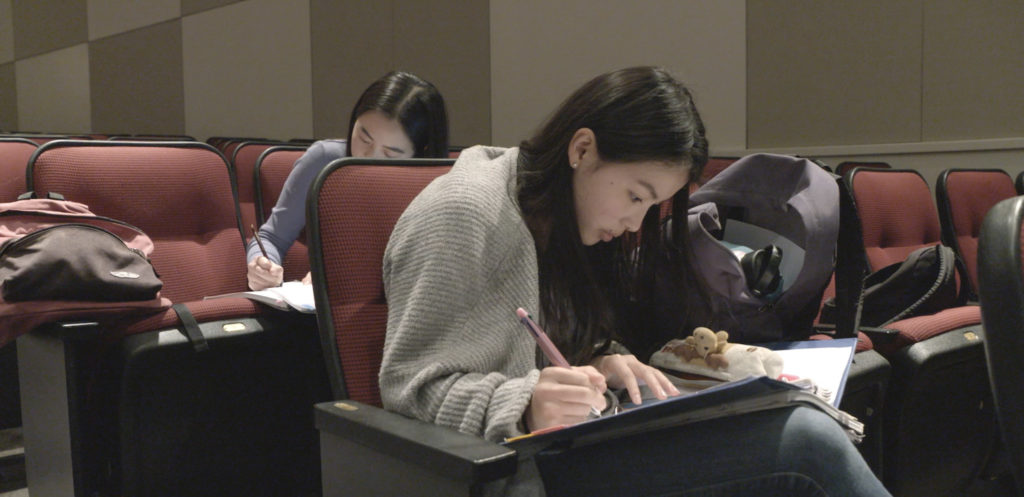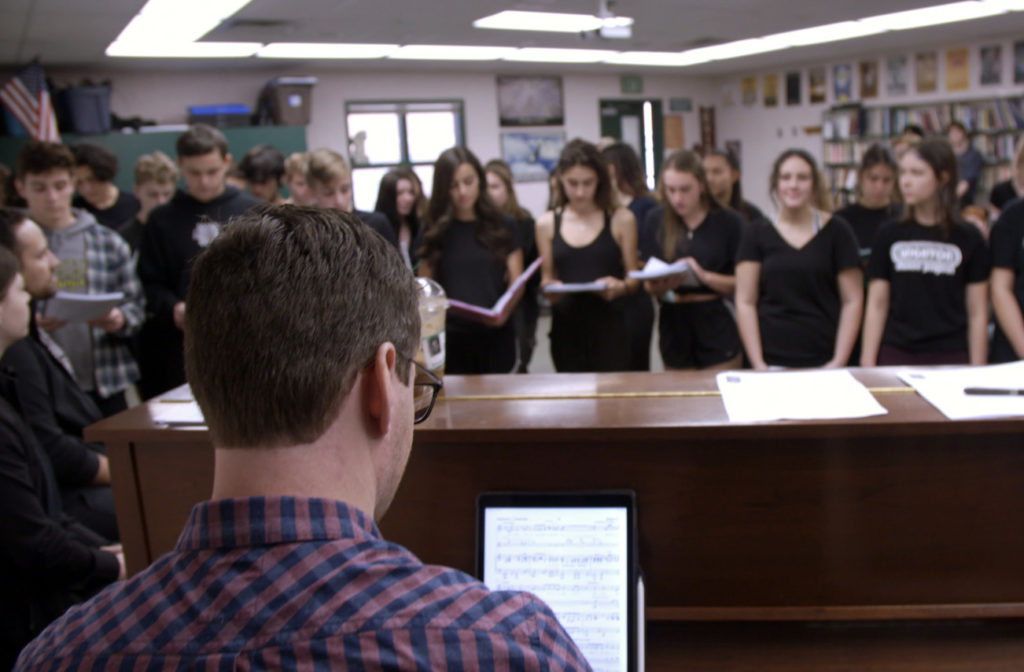
Synopsis : A deep dive into the lives of high school students in three radically disparate communities as they navigate the pressures around college while staging a musical, until seismic events upend their dreams and expectations.
Q: How did you get to know Kyle Holmes and David Taylor Gomes[creators of the musical “Ranked”]. At what point did you decide to make these students’ story into this documentary?
RS: Annie and I first were actually trying to make a film about the college scandal, the Varsity Blues scandal which was named by the FBI, looking into parents who were paying bribes to get their kids into college. We were looking at the pressures that parents and students feel to get into these colleges.
We had learned about Kyle and David’s musical, “Ranked”, and started to listen to the music, and realized that so much of what the musical does is touch on these themes that we were interested in: high school pressure, college. It evolved into this film that followed the musical into these schools across the United States, partly because it was hard to get access to parents talking in the Varsity Blues college scandal.
Really, ultimately, we found that we connected to the high school students much better through this musical. They were very open theatre kids expressing their anxieties and tensions that they felt, trying to achieve these high ranks in schools and to get into college. Then also, It gave us a window into their parents and the pressures that their parents feel. So that’s how we got started, and obviously, as you see through the film, it morphed again into something else.
Q: In this film, the focus was on four high schools: Granite Bay High School and Cupertino High School in California, Fordham High School for the Arts in New York City, and Ripley High School in West Virginia. In order to compare and contrast the social and school circumstances, how did you narrow it down to those particular schools?
AS: Sure. When Kyle and David were getting a lot of interest from other schools, they shared with us the list. It was important to us to look at communities that were very different from each other.
For Cupertino, it was fascinating for us. It’s relatively affluent, it’s a very expensive place to live; most of the people, as you hear in the film, are there for the schools. They’re very competitive. And these are families that are first-generation — a lot of them are recruited by tech companies because they were at the top of their fields in other countries. They often had multiple grad degrees. So the expectations for the kids are outsized.
Then in a place like Ripley, the kids are under different pressures. But they all still are fighting to be in the top ten percent because student scholarships are based on grades, and most of these kids are looking at scholarship support to pursue university education.
And then as we furthered our course of production, Covid made it almost impossible to be inside schools, especially where we had to travel. We started looking closer to home and we wanted to find something much more urban. We also wanted to have a black and brown perspective. The Bronx and Brooklyn had really great schools that also are where these kids are, for the most part, first-generation college students. So they had their own set of elements to navigate and pressures and expectations.
Q: Kyle and David’s strategy to make the musical for Broadway was very smart. Obviously, they don’t have the means or the budget, so they put together a recording of the performance for musicians in a studio, and they licensed it to sell it to other schools. What do you think about that process?
RS: Yeah, what was fun for us is that while we were focusing on the students putting on these plays in their high schools, Kyle and David were on another path. It allowed us to have this multi-layered thematic film where we could follow their journey to get their play and their words and their point out on a much larger level to try and take it to Broadway.
The professional, Broadway aspect of it added a whole other layer for us, and when the pandemic shut everything down, they were so close — right on the cusp of having this performance for these Broadway producers. Just as our students were on the cusp of performing the play, and it really could not have been any closer up against it when the pandemic shut everything down. So it really was this high that then came crashing down for everybody.
Q: In listening to the audition process of the students who were talking about the high school experience, what went through your minds watching that?
AS: What I was so astonished about by the auditions was that, first of all, the people who came in to audition really connected with the material. The casting director, Stephanie Clapper, really has a bead on people of tremendous voice and range, and the fact that so many were willing to travel in at a time when the world was feeling very precarious and shut down showed
I remember being in those rooms March 2nd and 3rd of 2020 and these people who firmly believed in theatre really desperately had a dream of being part of that show. There’s something very emotional about that. You see Mindy at the end, who is the director — she has her own reaction to it. She can feel that emotion in the room.
For us, I think the music was really the backbone of this process of making the film. The score that David and Kyle created really held us together both through the themes of the pandemic and also through the yearnings that a lot of each of our characters had to not be overwhelmed by anxiety and stress.
RS: I would just add to that, what was surprising for Annie and for me during this process was that the music became the soundtrack to the film in a way that really reflected everything we were feeling during the pandemic. So while it was written about high school anxiety and pressure and feeling “I can’t breathe”, we can’t be in our bodies and be in the moment, that really translated to everything we saw and experienced during Covid in addition to the George Floyd murder.
That was really surprising, and ultimately, when the play continues on and the students are singing the words that Kyle and David wrote, they’re connecting with it even more so because of everything we all lived through.

Q: Once the Covid lockdown began, schools were closed and they could not perform onstage. An unprecedented event was happening that was incomprehensible, and at the same time, the students needed to worry about grades and other school matters. What system did the schools have for mental heath issues and dealing with the students?
AS: Well, I’ll just speak really quickly of the Ripley experience. As we stayed in touch with the teachers, Christina — who is the head of the Drama department, who is in the film — expressed her own worry. There were two students in particular who just dropped out. Because they were teaching remotely, there is nothing to compel someone to show up, and even if they do show up, they’re clearly not doing their work or work starts to slide. In various film conversations — it’s not directly part of the film — Christina was really, really worried about these kids. She encouraged other kids to reach out to each other.
But Ripley did not have a lot of support in terms of how they were able to emotionally and mentally support their kids during the pandemic. They were just trying to teach them, which was hard enough. But Ricki, do you have comments?
RS: All I know, in addition to that, is Fordham School for the Arts. Linda, who was the drama teacher there, as Annie was saying, was really worried because she couldn’t get in touch with students at times. The assumption is that, kids not showing up on a Zoom and they’re not responding to emails or phone calls, something is going on. The school itself tried to connect with those students who had isolated themselves, and attach mental health conversations to people who were at the schools who were handling mental health.
But it was so overwhelming. Even my own son, who was in high school at the time. There were these parent-teacher meetings where they were talking about the mental health issues that they were seeing, and that the school itself couldn’t handle what it was seeing. It was so overwhelming for the school that they were just trying to give parents advice as well — warning signs, things like that. Especially when their kid isn’t showing up to school in person. It was very hard.
What we realized during the pandemic is that schools, at least in the United States, play a much larger role than just education. They really are a place where sometimes kids come for meals, it’s a safe place for them, they have mental health advising, other things than just a place where teachers are there to educate.
Q: Not only the students couldn’t perform onstage during Covid, but also you could not shoot the footage. So how did you approach shooting the film after the Covid lockdown?
AS: It’s interesting, because when everything happened, there were lots of protocols put in place. There was lots of testing, there was lots of wearing PPEs, we were all trying to figure stuff out pre-vaccination.
We ended up dropping cameras off with several of the students in the Bronx. They had cameras, they were trained on how to self-film. What you see in the film later is some of these kids are readying their college interviews online [that] they self-recorded. We often helped them set things up and then often would step outside of the room. We tried to minimize as much time as we could with people.
It’s difficult because there was a lot of navigation with the school board issues, in terms of just trying to access. We had fairly limited access within the school facility itself. But yeah, it was a combination of giving cameras to the kids, working with them, and then the kids were in different places like Cupertino and Ripley. We had them send us video journals —
RS: And we shot with them.
AS: Yeah.
Q: You also covered that you are in the Black Lives Matter movement. Ripley students were confronting the middle-aged white guys who carry around all those rifles, but things did not escalate. Can you talk about seeing these things there?
RS: Yeah, we were really blown away by the students in Ripley because it was a small group, and it was led by Leo, who was one of our main characters who put together this Black Lives Matter/George Floyd protest. They were unafraid, they were confronting — they were out there speaking what they felt they needed to speak, speaking their truth. The fact that this militia showed up across the street with the excuse that they were “protecting” the students — they confronted it head-on.
So for us as filmmakers, allowing the students to have that voice, putting a camera on them that could really shine on the work that they were doing, is always such an amazing moment, when we could elevate what they were doing in this small, isolated community.
Q: What do you want audiences to take away from this wonderful film?
AS: We did a screening on Tuesday for a bunch of high schoolers here in New York for the Doc NYC festival, and it was interesting to hear the comments from the kids afterwards. There were more comments than questions, but the comments came through that these kids felt seen and heard, that they saw reflections of themselves in the film, and a lot conversations around mental health and supporting teenagers and helping kids move through pressures.
So much of it is about giving these kids that sense of really being heard. I also loved that there was this senior boy who said after the film that he wanted to go home and hug his dad. I think there was a sense, we talked to some people we know who came into the film with expectations that they would feel anxious, that the pressures of this experience of navigating academics and trying to move on to college. But instead they felt very optimistic, and they actually had a sense of hope at the end of the film [that it] was really amazingly supportive for these kids through a really tough time.
RS: Yeah. I would just add that there was a lot of joy in the film, and it’s inspiring. Hearing that these students from so many different areas, socioeconomic backgrounds, all feel that this strong desire to do what they love and to do something that they’re passionate about, and that they could all connect over this one musical, we feel is part of the inspiring message of the film to take away.
Q: Thank you.

Check out more of Nobuhiro’s articles.
Here’s the trailer of the film.

